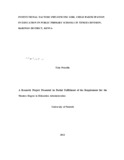| dc.description.abstract | The purpose of this study was to establish the institutional factors influencing girl child education in public primary schools in Tenges division, Baringo district, Kenya. The study was guided by objectives that focused on the influence of sanitary towels, headteachers adherence to educational policies, sexual harassment, female teacher and teaching and learning materials on girl child participation in education. The study embraced descriptive survey and the target population included the all the teachers and pupils in Tenges Division, Baringo district.
The sample size comprised on 180 pupils, Questionnaire was the main tool for data collections and the data was analysed using SPSS and presented using frequency distribution tables and pie charts. Through data analysis the study established that there was unavailability of sanitary towels among female pupils. Sanitation including use and disposal of sanitary towels influenced the participation of girl child in education. Lack of water and good toilets influenced girl child participation in education.
The study also established that child sexual harassment and lack of sanitary towels were part of the institutional factors that influence girl child participation in education. The study also established that majority of teachers and all the pupils were not aware of government policies that protected girl child participation in education. For the few teachers who said they were aware of the policies, they said the head teachers did not follow the laid down procedure in implementing them.
The main reasons given for nonadherence of the head teachers to the policies were ignorance and that they did not know how to go about it. Regarding if the school administration did anything to stop the harassment of girl pupils, the majority said it did not. The main sources of sexual harassments were the male pupils and male teachers. Early pregnancy was mentioned as being responsible for girl child dropping out of school.
The study tried to find out if fear of sexual harassment existed among female pupils and the majority said it did not. The study also found that teachers discriminated against girls by not encouraging them to perform well and portraying them as inferior sex in their speech. It was also found that teaching and learning facilities influenced girl child participation in education. The study recommends that government should enforce the girl child protection policies while making amendments where possible.
Teachers Code of Ethics and Public Officers Ethics Act should be applied to force male teachers conduct themselves in a mature way, there is need for the government to include sanitary towels in the free education budget to curb female pupils from absenteeism from school as well as dropping out of school. The study also recommends that there is need to improve teaching and learning aids since they affect girl child participation in school. In order to compliment this study, the researchers suggest that a study of this nature ought to be replicated in other district in order to draw conclusions based on the findings of the study. | en_US |

